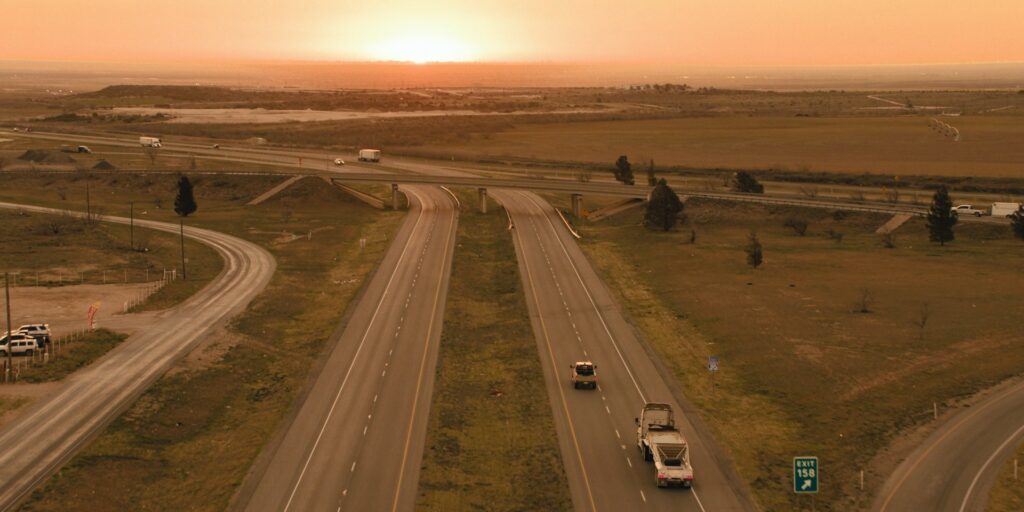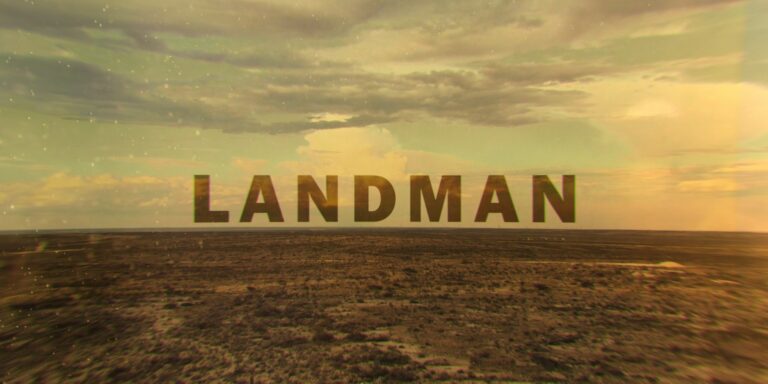- Oil Pros Weigh In On TV’s Truth and Tall Tales
- First Impressions: Welcoming Hollywood to the Oil Patch
- Inside Oilfield Culture — The Camaraderie’s Real, Y’all
- The Jargon: When Do They Speak Our Language?
- Character Chemistry and the Authenticity of Roughnecks
- Permian Setting: A Star in Its Own Right
- Contracts and Closing the Deal – Exaggerated or Just Entertaining?
- The People Problem: How ‘Landman’ Handles Women on the Job
- Hollywood Flair vs. Oil Patch Reality
- Final Drill Bit: Where Landman Wins and Where It’s All Hat, No Cattle
Oil Pros Weigh In On TV’s Truth and Tall Tales
If you work land or oil, you’ve probably had to answer this question in the last few months: “But how real is Landman, really?” And don’t lie – you secretly enjoy being the resident expert your friends bug for answers. Since Taylor Sheridan’s newest hit stormed onto TVs this year, suddenly everyone you know thinks they’re a driller or a title-hound. But for every slick deal and mud-streaked truck, does Landman actually pass the real-world test? We’ve wrangled insights from legit landmen, pumpers, and more than one grizzled rig dog to see exactly where the show strikes black gold – and where it sinks in the West Texas dust.

First Impressions: Welcoming Hollywood to the Oil Patch
The one thing landmen agree on: it’s wild seeing their world on the small screen. For decades, TV ignored the business of handshake deals and mineral rights. Now Billy Bob Thornton and a star-studded crew are elbow-deep in Texas crude, and people are Googling the Permian Basin faster than the price of West Texas Intermediate can spike after a hurricane.
But let’s get to the heart of it: Is the work on Landman just as roughneck as the real thing, or does it belong in the Hall of Overcooked TV Drama? Let’s break down the big picture first.
- The show nails the visual atmosphere. Real rigs, authentic Fort Worth streets, and enough background pickup trucks to fill a parking lot make the setting feel lived-in.
- If you know that power dynamics among dealmakers are as thorny as a West Texas mesquite, you’ll recognize those boardroom stares.
- Dialogue features a lot of bona fide Texas twang, so hats off to the dialect coach.
According to Christian Wallace – co-creator and former podcast host, and a bona fide Texas native – everybody aimed to keep it as “authentic” as possible. But how about the real nitty-gritty?
Inside Oilfield Culture — The Camaraderie’s Real, Y’all
Nothing gets the oil crowd talking like the show’s depiction of field crews. When workers bond over coffee out of thermos lids and rib each other in the dog house, real-life landmen nod in approval. “It is a community… I think we benefit from that in Fort Worth,” one tells the Fort Worth Star-Telegram.
Some topics spark both pride and a little envy:
- The unfiltered banter at rig sites? Pretty much spot-on.
- The nighttime shots, with flare stacks burning like dragon breath, get even the crustiest industry vets hyped.
- Oilfield parties and rodeos, featured in episode after episode, mirror the ways Texans unwind after fourteen hours on a rig.
But here’s the kicker: while the show brings Permian culture to life, it sometimes veers Hollywood. According to landmen in Wyoming, the series’ wildest storylines – drug cartels, blackmail, property sabotage – don’t usually roll up with the water trucks. As one put it: “We don’t have the cartels poaching our gear. We mostly just worry about drought and leasing headaches.”
The Jargon: When Do They Speak Our Language?
Landman gets major points for throwing around genuine oil patch lingo. You’ll hear about “checks in the mail,” “title runs,” and “mineral rights” almost every episode. For those living the grind, it feels familiar. Deals happen at kitchen tables. Big personalities haggle over every phrase in a contract. Billy Bob’s Tommy Norris even wrangles over Section 16 – a nod to Texas’s wild land policies.
Yet for the experienced, the show trips up on procedures every now and then. Case in point: that infamous pump rig accident scene. An oilfield veteran cringed, writing that the “technical failures…are embarrassing and your technical consultant got everything wrong in the Blowout scene”. He spotted wrong tools, wrong sequence, and definitely the wrong physics.
Where else does Hollywood miss?
- Title work gets speeded up. In the real world, running a title from patent to present can suck up a whole summer.
- Everyone’s always yelling about tens of millions in royalties. True, there’s big money, but not every deal ends up with someone holding a gold nugget. Sometimes, your check is just enough for a decent steak and a fresh Stetson.
- Negotiations on-screen lean heavy on drama. In reality, the pain comes from endless paperwork, not parking-lot shakedowns.
Character Chemistry and the Authenticity of Roughnecks
The series shines when it shows oilfield hands in their natural state – worn out, covered in dust, fiercely loyal. Here’s where pros feel seen. The competition and war stories ring true. And yes, stubbornness might as well be written into most landmen’s contracts.
But the dramatized villains and power-hungry boardroom bosses? Those feel a little much. And don’t get critics started on the “every oil exec is scheming” trope. Some real landmen roll their eyes and point out how rarely any deal feels life-and-death. Usually, it’s a game of patience, cold calls, and tracing handwritten deeds from 1912.
Permian Setting: A Star in Its Own Right
Fans agree – the show’s love affair with West Texas looks genuine. Wide-open landscapes and sun-baked oil derricks are more than just eye candy. Sheridan’s crew filmed with real equipment and on-site pipes, which lends street cred. Locals in Fort Worth have even spotted familiar diners and diners popping up in establishing shots.

But the real professionals catch one odd detail: Nobody ever accidentally steps in a rattlesnake den. If you’ve walked a mile of fenceline in Midland, you know suspense means scanning for more than just company men.
Contracts and Closing the Deal – Exaggerated or Just Entertaining?
Sheridan packs the drama into every contract signing. Lawsuits, betrayals, and juicy pay-offs turn up faster than frack sand trucks during a boom. That isn’t everyone’s cup of iced tea. Landmen laugh about the car-chase style sense of urgency around some mineral transactions. “If only it was that exciting,” more than one prospector jokes.
What’s obviously accurate, though, is the high stakes. Millions ride on the right comma or reservation. Families split, friendships die. Someone always wants that last royalty decimal.
The People Problem: How ‘Landman’ Handles Women on the Job
Here’s where Sheridan catches heat. More than one review calls out the show for its two-dimensional female characters. NPR’s recap tags most women on screen as “caricatures”. Viewers who know real lease hounds and title attorneys strongly wish for richer storylines in Season 2. Strong women have always pioneered the business (some run entire brokerages), so fresh scripts better catch up.

Hollywood Flair vs. Oil Patch Reality
Of course, no one tunes in for just paperwork. The mix of power grabs, roughneck loyalty, and suspenseful standoffs creates real entertainment. Still, the majority of industry pros agree – while Landman captures the vibe, it occasionally swaps realism for popcorn. As long as viewers don’t take every cartel subplot at face value, the show delivers a flavor of a business hidden behind barbed wire and No Trespassing signs.
Final Drill Bit: Where Landman Wins and Where It’s All Hat, No Cattle
- Genuine: The sense of community, the visuals, and the lingo ring true.
- Slightly Fictionalized: The risk and wheeling-dealing dial up for TV. Cartel drama and boardroom betrayals belong more to Hollywood than most landman day-to-day.
- Room to Grow: More authentic female characters and clearer technical details could drill Landman even deeper into real oil patch grit.
For now, here’s the buzz around Fort Worth water coolers: folks are proud to see their messy, booming world get a moment in the TV spotlight – even if there’s more cinematic flair than actual mud on those boots. If future episodes shape up, who knows? The next marathon might actually get a few field hands to put down their title abstracts, grab popcorn, and start placing bets on which rig hand will botch a casing run next. Until then, may your leases close smooth and your boots stay out of rattler nests.




